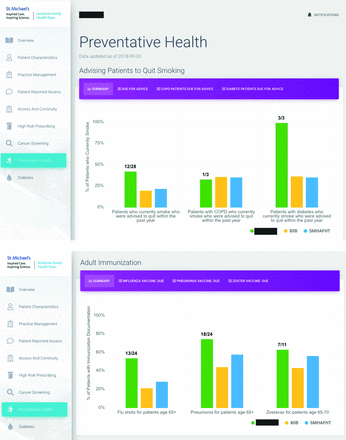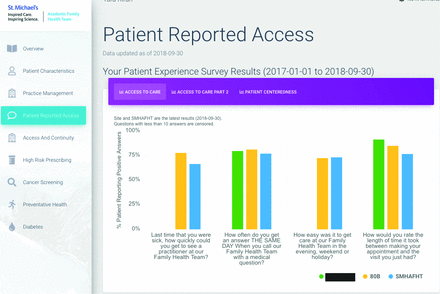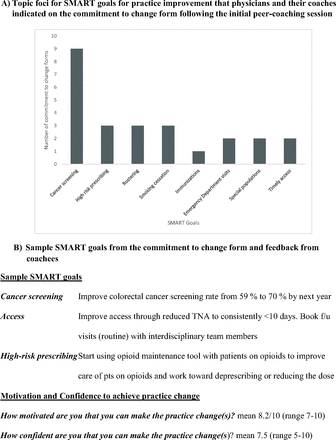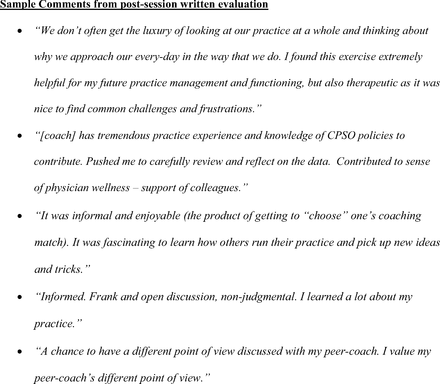Abstract
Introduction: Peer coaching has the potential to enhance the effectiveness of clinical performance feedback reports to family physicians, but few peer-coaching quality improvement programs have been implemented and evaluated in primary care. Authors designed, implemented and evaluated a peer-coaching program for family physicians in a large, academic primary-care organization to explore its potential to enhance family physicians' use of clinical performance data for quality improvement.
Methods: Coaches were nominated by their peers and were trained to follow an evidence-informed facilitated feedback model for coaching. Data were collected through surveys, a focus-group with coaches, and individual interviews with coached family physicians (“coachees”). Data were analyzed inductively using reflexive thematic analysis.
Results: Authors trained 10 coaches who coached 25 family physicians over 3 months. Coachees who completed the survey (21/25) indicated a desire for additional coaching sessions in future; most (19/21) reported confidence in making practice change. Interview (n = 11) and focus-group participants (n = 8) findings validated acceptability of the coaching approach that emphasized empathy ahead of change-talk. Coaches helped coachees interpret care-quality measures, deal with negative emotional responses evoked, encouraged a sense of accountability for improvement, and sometimes offered new ways to manage common challenges. Coaching sessions led to a wide range of practice-improvement goals. However, effects on practice change were felt to be limited by the data available and the focus on individual physician factors when broader clinic issues acted as important barriers to improvement.
Conclusions: Peer coaching is a feasible approach to supporting family physicians’ use of data for learning and practice improvement. More research is needed to understand the impact on practice outcomes and physician wellness.
- Coaching
- Family Medicine
- Family Physicians
- Feedback
- Primary Health Care
- Qualitative Research
- Quality Improvement
Background
There are persistent gaps in the quality of primary care, from long wait times to suboptimal chronic disease management.1⇓⇓⇓⇓–6 Feedback of clinical performance data to family physicians has been identified as a valuable strategy7 to improve quality of care, but its effectiveness depends on various factors, including the nature of the data, how it is presented, and who presents it.8 Our previous research noted a gap between physicians’ intention to use clinical performance data for practice improvement and their actions.9 Discussions with colleagues are one recognized way to improve the effectiveness of clinical performance feedback8 but more research is needed on how structured discussions can potentially close this intention to action gap in the context of family medicine.
Specifically, targeted peer-coaching interventions piloted in specific contexts and settings have shown promise for improving performance of physician trainees,10 improving patient experience scores in outpatient settings,11 and improving physician readiness for self-directed learning.12 Yet, there is limited evidence guiding integration of peer-coaching for fully-licensed family physicians. In 2018 to 2019, we launched 3 cointerventions sequentially to accompany physician-level audit and feedback reports at a large academic practice. The cointerventions included structured self-reflection, peer-coaching, and facilitated group discussions. This article describes the implementation and process evaluation of the peer-coaching program and explores its potential to support family physicians to use clinical performance data to improve practice. We hypothesized that our program would be feasible to implement, acceptable to physicians and have the potential to shift family physicians along the behavior change spectrum, from reviewing data to making changes in clinical practice.
Methods
Context
The peer-coaching program was implemented at St. Michael’s Hospital Academic Family Health Team (SMHAFHT) in Toronto, Canada. The team consisted of approximately 75 staff physicians, 40 resident physicians, and 60 other health professionals, serving around 45,000 patients across 6 downtown clinics. The team received performance reports on quality measures, covering patient experience, continuity, diabetes, cancer screening, and high-risk prescribing (Appendix 1), collected from electronic medical records, administrative data, patient experience surveys, and manual collection.13
Intervention
The coaching program was based on Sargeant’s R2C2 facilitated feedback model14 and informed by the Institute for Health care Improvement’s (IHI) Model for Improvement15 and the Clinical Performance Feedback Intervention Theory (CP-FIT).16 Peer-coaches were physicians nominated by peers who participated in structured self-reflection.9 Coaches attended a 2-hour training session covering the theory of clinical performance feedback, quality measures, and common physician concerns.14 The R2C2 approach consists of 4 phases: build Relationship, explore Reactions, explore Content, and Coach for performance change.
In their one-time coaching interaction, coaches and coached physicians (“coachees”) collaborated on a 'commitment to change' form, identifying areas for improvement, setting SMART goals following IHI’s Model for Improvement, and sharing practical change ideas (Appendix 2). Coached physicians and coaches submitted this form to the coordinator, and 3 months postcoaching, coachees received their forms reflecting on goal progress. Coaches were compensated at $135 per coaching hour.
Recruitment
In January 2019, staff physicians received personalized e-mails with instructions on accessing feedback reports. The e-mail included an invitation to sign up for a one-on-one session with a peer-coach. Specifically, they were invited to indicate their top 3 coaches, and then matches were assigned based on preferences, coach workload, and availability. Three reminders were sent over a 4-month period, to encourage physicans to sign up for a session. Coachees could claim 4 professional development credits on submitting a commitment to change form. Coachees had the option of sharing practice data with their coach.
Data Collection
Coachees had the option to complete an evaluation form and a subset of coachees participated in semistructured interviews, guided by Normalization Process Theory (NPT),17 between March and July 2019. Coaches completed a self-assessment survey, and a subsequent focus group with 10 coaches explored their perceptions of data for physicians, the impact of the coaching session, and reflections on supporting physicians in using data.
Data Analysis
Data analysis utilized codebook thematic analysis and NPT’s 4 components as the coding frame.18,19 Two coders independently coded a subset of 3 transcripts, creating an initial codebook. Early codes and potential themes were shared with the research team to establish clarity on objectives of the coding and share initial interpretation. One team member coded the remaining transcripts, regularly meeting with the research team to discuss findings. The coaching experience and reactions of both coaches and coachees were explored using the R2C2 framework. We used NVivo 12 to organize our analysis. Themes were shared with SMHAFHT physicians at staff meetings as a form of member checking.
Results
Out of 75 eligible physicians, 70 were nominated to become a peer-coach. We selected and trained 10 physician peer-coaches who had multiple nominations to cover a range of seniority, expertise, practice sizes, and location, with at least 1 representative from each of the 6 clinical sites. Of these peer-coaches, 60% were women, the number of clinical half-days ranged from 4 to 10, and medical school graduation year ranged from 1977 to 2010, with 60% graduating between 1997 to 2005.
In the first 3 months 33% of physicians completed a coaching session (Table 1). More than half of coachees chose a colleague from a different clinic site as their coach, and most were comfortable sharing their data with their coach. All completed a commitment to change form, with SMART goals covering various topics, leaving participants motivated and confident to make practice changes (Appendix 3).
Characteristics of Coachees Who Participated in Peer-Coaching Sessions Compared to All Staff Physicians in the Primary Organization (2019)
Peer-Coach Self-Assessment Survey
The average reported duration of a coaching session was 37 minutes. Coaches reported high levels of engagement from coachees and consistent application of the R2C2 model during the session (Table 2).
Results of the Self-Assessment Survey Completed by Coaches After Their Coaching Session to Assess Fidelity to the Planned R2C2-Informed Coaching Approach
Coachee Written Evaluation Survey
Twenty-one of 25 coachees completed the optional written evaluation. Written feedback was generally positive (Appendix 3), with coachees expressing the desire to meet with a coach again (21/21), indicating learning from the session (20/21), and planning to make changes to their practice (19/21).
Qualitative Data
Twenty physicians were invited for a qualitative interview; 11 agreed to participate, 2 declined, and 7 did not respond. Eight of the 10 coaches participated in a focus group.
Building Relationships
Coachees highlighted the importance of qualities like humility, nonjudgment, curiosity, thoughtfulness, and support in a coach. Both coachees and coaches emphasized the development of a trusting, supportive relationship as foundational to coaching success. Coaches intentionally considered the broader context of a physician’s life when discussing quality measures and described the importance of supporting physician wellness even though this was not a focus of the training. Many highlighted that the coaching session seemed to enhanced collegiality (Table 3).
Quotations from Coaches and Coachees Who Participated in the Focus Group and Interviews, Organized by the Sargeant’s R2C2 Facilitated Feedback Framework
Exploring Reactions
Coaches assisted coachees in dealing with negative emotions sparked by data, including feelings of inadequacy and hopelessness. The impracticality of improving care for each quality measure, potential time constraints, and concerns about unfair judgment led to a reluctance to engage fully with the data. Coaching sessions validated coachees' experiences of juggling numerous priorities and acknowledged emotional reactions to quality measures, providing reassurance and diminishing feelings of isolation and overwhelm (Table 3).
Exploring Content
Coaches helped coachees interpret the data and supported them in gaining insights despite known data limitations. Coachees appreciated being able to set and lead the agenda of the conversation (Table 3).
Coaching for Performance Change
Coachees described how the session led to a sense of feeling accountable for acting on the data. The dedicated time and coaching helped them focus on a practice area and set a goal. The sessions offered an opportunity to learn from colleagues and manage common challenges (Table 3).
Limitations and Dissent
Participants highlighted that coaching could not compensate for incomplete or inaccurate data, or aspects of care not captured by the feedback report. In addition, peer-coaching focused primarily on physician-level actions rather than clinic-level actions, although both were often necessary for systemic change (Table 3).
Discussion
The study demonstrates the implementation success and acceptability of a pilot peer-to-peer coaching program among family physicians. Coaching enabled physicians to develop specific quality improvement goals in an area relevant to them. Evaluations found that physicians valued the time spent with the coach and left the session feeling highly motivated and confident that they would make practice change. Qualitative interviews suggested that the coaching supported physicians to move from intention to action. It helped them interpret the data and deal with negative emotional responses to the data, it helped keep them accountable to act, and it provided them with practical change ideas used by colleagues that they could enact in their own practice.
The findings align with existing literature on peer-coaching as an innovative model of continuing professional development, enhancing physician readiness for self-directed learning and improvement.12,20,21 Our results are also consistent with research demonstrating relationship-centered coaching's positive impact on physician-assessor interactions during regulatory authority visits.22 Sargeant’s R2C2 facilitated feedback model to train and guide peer-coaches14 provided a helpful framework for this program, emphasizing the importance of building relationships, exploring reactions and content, and coaching for performance change.
The study describes a pilot of a theory-informed peer-coaching program for family physicians that was well-received in a large, urban, academic primary care setting. However, data on potential impact is limited by biases inherent in self-reporting and self-selection of physicians into the program. Comments from both coaches and coachees suggested that coaching may have impacted family physician wellness and enhanced collegiality, however, these impacts were not formally measured in our study. We also did not collect data on clinical outcomes or patient. We report on early uptake, but further research is needed to understand the potential for spread, sustainability and medium to long-term impact with ongoing coaching sessions.
Conclusion
Peer-to-peer coaching is a promising approach to supporting family physicians in using data for learning and practice improvement. Specifically, it has the potential to close the gap between improvement intention and action. Future research is needed to understand whether peer-to-peer coaching can improve practice outcomes and physician wellness.
Acknowledgments
Thank you to Linh Luong and Tara Upshaw for their help with data analysis; Maryam Daneshvarfard for support with manuscript preparation and submission; Rick Wang and Mo Alhaj for preparing the audit and feedback reports; Trish O’Brien for her insights on the project design; and Curtis Handford, Holly Knowles, Bruce Kwok, William Watson, and James R. M. Owen, MD, MLA, and JR, our other peer coaches.
Appendices
Appendix 1. Sample Screen Shots from the Physician Dashboard
Appendix 2. Commitment to Change Plan
Appendix 3. Topic Foci for SMART Goals for Practice Improvement, Sample SMART Goals from the Commitment to Change Form and Feedback from Coachees
Notes
This article was externally peer reviewed.
Funding: This study received funding from the St. Michael’s Hospital AFP Innovation Fund. The opinions, results and conclusions reported in this paper are those of the authors and are independent from the funding sources. Dr. Kiran is the Fidani Chair in Improvement and Innovation at the University of Toronto and is also supported as a Clinician Scientist by the Department of Family and Community Medicine at the University of Toronto and at St. Michael’s Hospital. At the time of the study, she was also supported by the Canadian Institutes of Health Research and Health Quality Ontario as an Embedded Clinician Researcher. Noah Ivers is supported by a Canada Research Chair in Implementation of Evidence Based Practice and is also supported as a Clinician Scientist by the Department of Family and Community Medicine at the University of Toronto and at Women’s College Hospital.
Conflict of interest: Drs. Kiran, Ramji, and Weyman were all in physician leadership roles with the St. Michael’s Hospital Academic Family Health Team during the study period. Dr. Ramji has been a Quality Improvement Coach with the College of Physicians and Surgeons of Ontario since December 2021. The authors declare no other conflicts of interest.
Authors’ contributions: TK, KD, LD, KW and NI conceived of and designed the study together. KD collected the data and TK, KD, LD and NI conducted the analysis. All authors helped interpret the data. TK and NI drafted the manuscript and all authors critically reviewed it. All authors read and approved the final manuscript.
Ethics approval: Ethics approval was obtained from the Research Ethics Board at Unity Health Toronto, Toronto, Canada (Approval 18-105, 30.05.2018).
To see this article online, please go to: http://jabfm.org/content/37/6/996.full.
- Received for publication December 22, 2023.
- Revision received February 7, 2024.
- Revision received April 30, 2024.
- Accepted for publication May 28, 2024.












